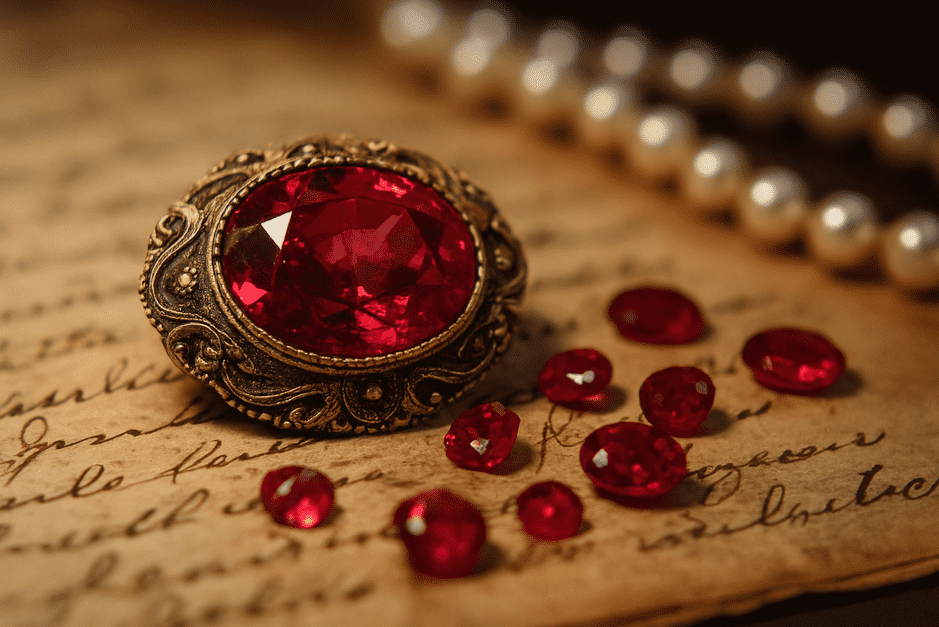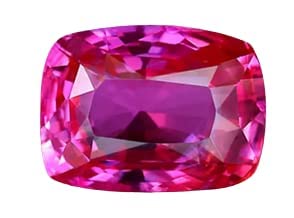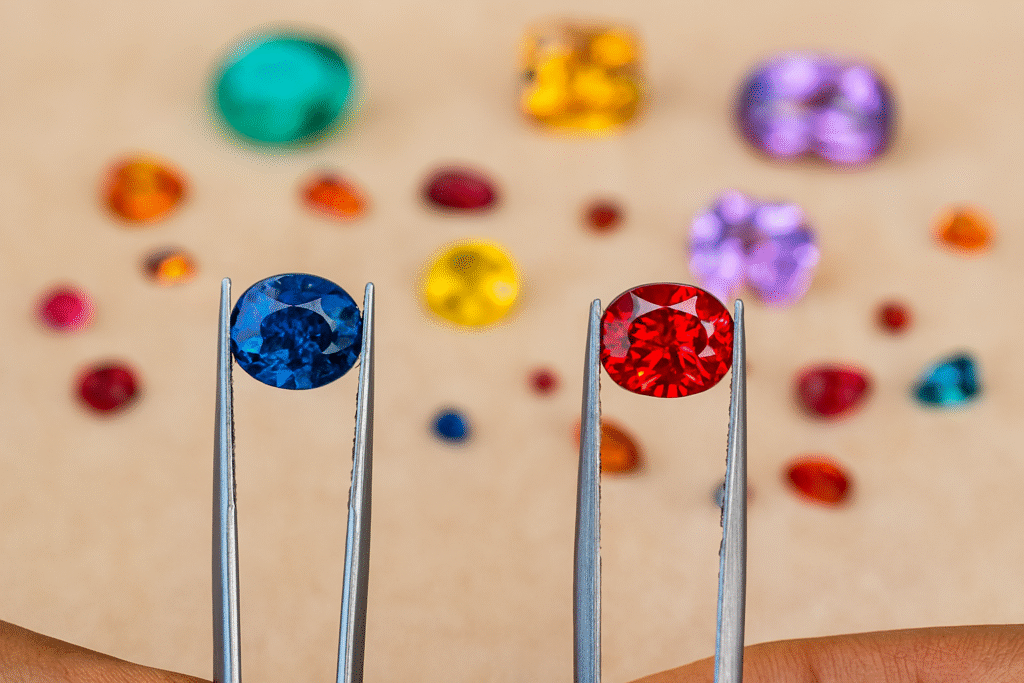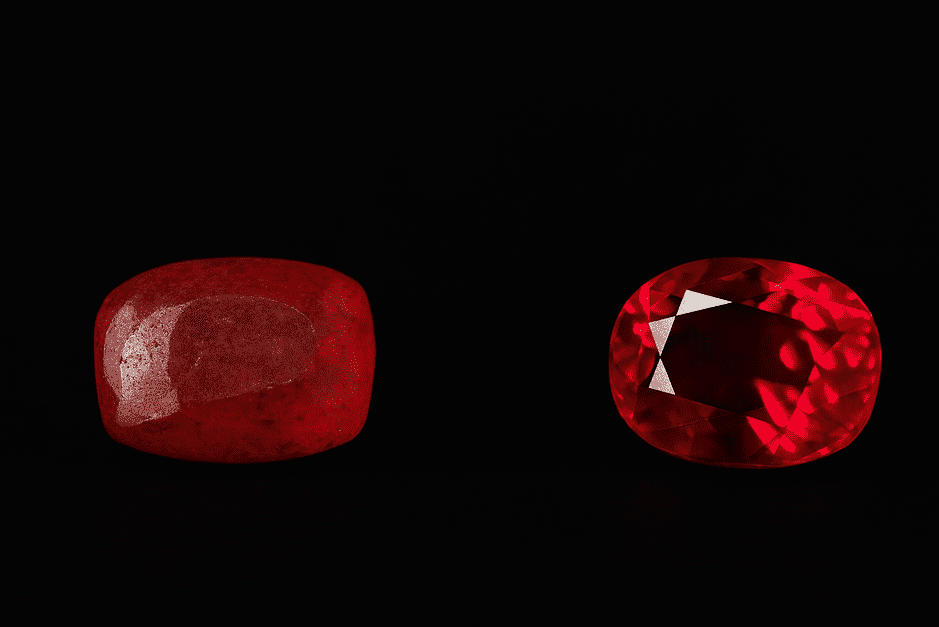Table of Contents
- Introduction
- What Is the Hidden Value in Old Cut Rubies?
- Why Recutting Old Cut Rubies Can Lower Value
- Auction Results That Prove the Value of Vintage Cuts
- Expert Advice on Preserving Vintage Ruby Cuts
- FAQs
Introduction
The hidden value in old cut rubies often surprises families. Many inherit a cushion or European cut ruby and immediately consider recutting. However, pausing to evaluate the gem first can reveal hidden benefits. In fact, preserving the original cut often increases both historical significance and market value. Additionally, collectors consistently pay higher prices for gems that retain their antique charm.
What Is the Hidden Value in Old Cut Rubies?
First, old cuts reflect craftsmanship from earlier centuries. They were designed for candlelight, which gives them a warm glow. As a result, these rubies stand apart from modern brilliants. Moreover, collectors prize authenticity, and auctions consistently confirm the strong demand for vintage cuts. Therefore, keeping the original style can significantly impact resale value.
Why Recutting Old Cut Rubies Can Lower Value
When you recut a ruby, you actively reduce carat weight. Even a 10–15% loss can significantly lower resale prices. Furthermore, reshaping erases the historical style that makes the gem special. Because of that, many experts recommend preserving the original cut. For example, reshaped heirlooms often lose market appeal despite improved sparkle.
Auction Results That Prove the Value of Vintage Cuts
- Sotheby’s sold a Burmese cushion ruby for 35% more than a recut equivalent.
- Likewise, family heirlooms I appraised in India lost half their market value after reshaping.
- In fact, market research shows vintage rubies in original cuts typically sell 20–40% higher than modified stones.
Expert Advice on Preserving Vintage Ruby Cuts
With over 40 years of global gemstone experience, I have learned this: “The key is to respect the cut your gemstone already carries.” Additionally, preserving old cuts protects both history and market value. Finally, collectors recognize and reward authenticity, which modern recuts rarely match.
Related Articles:
- To buy gems wisely, see Gemstone Buying Pitfalls Every Collector Should Avoid.
- To understand jewelry quality, visit Understanding BIS Hallmark: What It Means for Your Jewellery.
Explore More Here:
Auction data from Sotheby’s and Christie’s confirms ongoing demand for old cuts.
FAQ
Q1. What is the hidden value in old cut rubies?
The hidden value in old cut rubies comes from history, craftsmanship, and rarity. Vintage cuts often sell 20–40% higher than recut stones.
Q2. Should I recut my old ruby?
No, unless it is badly damaged. Recutting actively reduces carat weight and diminishes historical value.
Q3. How can I identify an old cut ruby?
Look for cushion-like shapes, high crowns, and deep pavilions. A gemologist can verify authenticity.
Q4. Where can I sell an old cut ruby?
Sell through auction houses or certified dealers that value vintage cuts.
Q5. Why do collectors pay more for old cut rubies?
Collectors actively seek authenticity and rarity. Original cuts preserve historical craftsmanship.
Introduction
This comprehensive Watch Buying Guide answers the most common questions about timepieces.
Whether you’re purchasing your first watch or adding to your collection, these expert insights help you make informed decisions.
From understanding movement types to choosing the right size for your wrist, you’ll find everything needed before making a purchase.
What Types of Watches Should You Consider? – Watch Buying Guide Insights
Understanding the five main categories helps narrow your options:
- Mechanical watches – Use springs and gears. No battery needed.
- Quartz watches – Battery-powered; most accurate.
- Automatic watches – Wind themselves from wrist movement.
- Digital watches – Display time numerically on a screen.
- Smartwatches – Connect to your phone and track fitness data.
Accuracy Expectations – Watch Buying Guide Tips
- Quartz watches – Lose about 15 seconds per month.
- Mechanical watches – Lose 20–40 seconds per day.
- Atomic watches – Lose 1 second every 100 million years.
- Your phone’s clock stays perfectly accurate.
Water Resistance Considerations
Water resistance ratings affect usage scenarios:
- 30m – Handles rain and handwashing
- 50m – Safe for swimming
- 100m – Suitable for snorkeling
- 200m+ – Scuba diving
Replace gaskets every 2–3 years to maintain resistance.
Maintenance Schedule – Watch Buying Guide Advice
- Quartz watches – Battery replacement every 1–3 years.
- Mechanical watches – Full service every 3–5 years.
- Service costs: $200–800 depending on the brand.
Watch for stopping, running fast/slow, or condensation under the crystal.
Pricing Strategy
- Budget watches – Plastic cases, basic movements
- Mid-range watches – Steel cases, reliable mechanisms
- Luxury watches – Precious metals, hand-finished details
Remember: craftsmanship, materials, and brand prestige drive prices.
Sizing Advice
- 6–7 inch wrists – 38–42mm
- 7–8 inch wrists – 40–44mm
- 8+ inch wrists – 42–46mm
Ensure lugs don’t overhang wrist edges.
Complications to Prioritize
- Date display – Useful daily
- GMT hand – Second time zone
- Chronograph – Stopwatch
- Moon phase – Decorative
- Annual calendar – Adjusts month lengths
More complications = more things that can break.
Maintenance Tips
- Clean with a soft cloth
- Avoid extreme temperatures & magnets
- Wind manual watches daily
- Use watch winders for automatics
- Don’t adjust date between 9 PM–3 AM
Investment Potential
- Most watches lose value after purchase
- Only select Rolex, Patek Philippe, Audemars Piguet models appreciate
- Vintage watches from 1960s–70s show strong growth
- Buy watches you enjoy wearing, not solely for investment
Essential Tools
- Spring bar tool
- Case back opener
- Soft polishing cloth
- Watch cushion
- Demagnetizer
Where to Purchase
- Online – Better selection, often cheaper
- Physical stores – Try before buying
- Authorized dealers – Full warranties
- Grey market – Discounts, limited warranty
- Forums/eBay – Vintage pieces, verify authenticity
Learn More:




